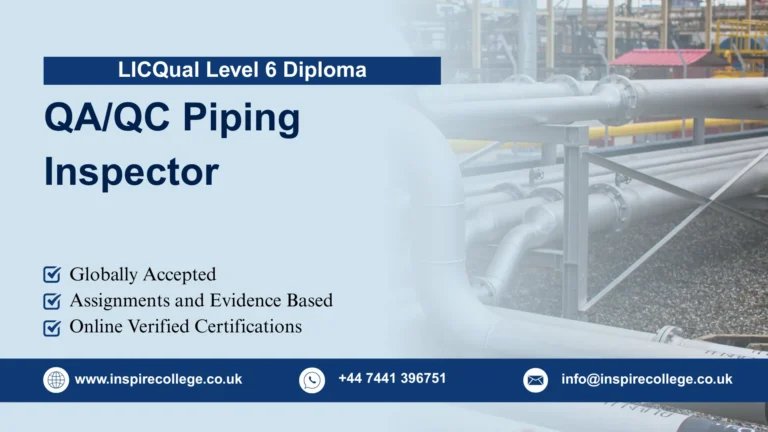
ICTQual Level 6 Diploma in Civil Engineering 360 Credits – Three Years
The ICTQual Level 6 Diploma in Civil Engineering is a comprehensive program designed to equip learners with advanced technical knowledge, practical skills, and professional competencies essential for modern civil engineering projects. Civil engineering remains a cornerstone of infrastructure development worldwide, encompassing construction, structural design, transportation, water resources, and environmental management. This diploma prepares learners to meet the growing demand for skilled professionals capable of designing, managing, and implementing complex engineering projects.
Spanning three years and awarding 360 credits, the program provides a structured pathway to mastering foundational, intermediate, and advanced civil engineering concepts. Learners gain expertise in structural analysis, geotechnical engineering, construction materials, surveying, environmental engineering, transportation systems, and project management. Advanced modules cover sustainable construction practices, smart infrastructure technologies, and innovative design methodologies, ensuring graduates are prepared for the challenges of modern civil projects.
The curriculum balances theoretical knowledge with practical application. Students engage in laboratory experiments, field surveys, construction simulations, and industry-based projects. These hands-on experiences enable learners to develop problem-solving skills, technical proficiency, and project management capabilities essential for delivering safe, efficient, and sustainable infrastructure solutions. The program also emphasizes professional ethics, safety standards, and regulatory compliance, preparing graduates for leadership roles in multidisciplinary engineering teams.
Completing the ICTQual Level 6 Diploma in Civil Engineering provides learners with a globally recognized qualification, opening pathways to advanced career opportunities and higher education. Graduates emerge as competent, innovative, and industry-ready civil engineers, capable of contributing to infrastructure development, sustainable construction, and urban planning projects worldwide.
The ICTQual Level 6 Diploma in Civil Engineering is designed to prepare learners for advanced studies and professional practice in civil engineering. Meeting the entry requirements ensures learners have the foundational knowledge, skills, and competencies needed to excel in both theoretical and practical aspects of the program.
Age Requirements
- Applicants must be at least 18 years old at the time of enrolment.
Educational Requirements
- Completion of a Level 5 Diploma or equivalent in Civil Engineering, Construction Technology, Structural Engineering, or related technical fields.
- Strong background in mathematics, physics, and basic engineering principles is recommended.
- Fresh graduates with STEM-based secondary education (A-levels, high school diploma, or equivalent) are eligible.
Professional Experience
- Professionals with 2–3 years of verifiable experience in construction, infrastructure projects, surveying, or civil engineering-related work may qualify for direct enrolment.
- Practical experience in project management, site supervision, or engineering design is advantageous but not mandatory for fresh learners.
English Language Proficiency
- Applicants whose first language is not English must demonstrate proficiency through recognized tests such as IELTS (minimum 5.5 overall), TOEFL, or equivalent.
- Competency in technical reading, writing, and communication in English is essential for successful course completion.
By fulfilling these entry requirements, learners are well-prepared to engage fully with the ICTQual Level 6 Diploma in Civil Engineering, gain advanced technical and professional skills, and pursue rewarding career opportunities in the global civil engineering and infrastructure sectors.
Mandatory Units
This qualification, the ICTQual Level 6 Diploma in Civil Engineering 360 Credits – Three Years, consists of 36 mandatory units.
Year 1: Foundation and Core Engineering Concepts
- Introduction to Civil Engineering
- Mathematics for Engineers
- Engineering Mechanics
- Construction Materials
- Surveying and Measurement
- Environmental Science for Engineers
- Technical Drawing and CAD
- Hydraulics and Fluid Mechanics
- Geology and Soil Mechanics
- Health and Safety in Construction
- Construction Methods and Technologies
- Communication and Professional Skills
Year 2: Advanced Engineering Topics and Specializations
- Structural Analysis and Design
- Geotechnical Engineering
- Transportation Engineering
- Water Resources Engineering
- Building Information Modeling (BIM)
- Advanced Surveying and GPS Technologies
- Steel and Concrete Structures
- Sustainable Construction Practices
- Highway Design and Maintenance
- Construction Contracts and Law
- Project Planning and Management
- Engineering Economics
Year 3: Professional Practice, Innovation, and Capstone Projects
- Professional Ethics and Responsibilities in Civil Engineering
- Advanced Structural Engineering Applications
- Bridge Design and Construction Management
- Foundation Engineering for Complex Projects
- Urban Infrastructure Planning and Development
- Earthquake-Resistant Structural Design
- Construction Site Management and Supervision
- Environmental Impact Assessment for Civil Projects
- Risk Assessment and Mitigation in Construction Projects
- Entrepreneurship and Leadership in Civil Engineering
- Smart Cities and Sustainable Infrastructure
- Capstone Project (Professional Practice)
The ICTQual Level 6 Diploma in Civil Engineering equips learners with comprehensive theoretical knowledge, practical skills, and professional competencies essential for modern civil engineering practice. Upon completing this program, graduates will be prepared to design, manage, and implement infrastructure projects safely, efficiently, and sustainably.
Year 1: Foundation and Core Engineering Concepts (120 Credits)
Introduction to Civil Engineering
- Understand the fundamental principles and roles of civil engineering in infrastructure development.
- Apply basic engineering concepts to simple construction projects.
- Develop awareness of industry standards, codes, and professional practices.
Mathematics for Engineers
- Solve engineering problems using calculus, algebra, and statistics.
- Apply mathematical modeling techniques to structural and fluid mechanics problems.
- Develop analytical skills for quantitative decision-making in engineering tasks.
Engineering Mechanics
- Analyze forces, moments, and equilibrium in static and dynamic systems.
- Apply mechanics principles to structural and machine components.
- Use problem-solving techniques for practical engineering scenarios.
Construction Materials
- Identify properties and applications of concrete, steel, timber, and composite materials.
- Conduct basic material tests and quality control measures.
- Evaluate suitability of materials for different construction purposes.
Surveying and Measurement
- Perform land surveys using traditional and modern measurement techniques.
- Apply principles of leveling, contouring, and distance measurement.
- Produce accurate site maps and construction layouts.
Environmental Science for Engineers
- Understand environmental impacts of civil engineering projects.
- Apply principles of sustainable construction and resource management.
- Assess pollution control and waste management strategies.
Technical Drawing and CAD
- Create accurate engineering drawings for structures and systems.
- Utilize CAD software for 2D and 3D modeling of civil engineering designs.
- Translate design specifications into visual representations.
Hydraulics and Fluid Mechanics
- Analyze fluid properties and behavior in pipelines, channels, and systems.
- Apply hydraulic principles to design water distribution and drainage systems.
- Conduct basic calculations for flow rates, pressures, and pipe sizing.
Geology and Soil Mechanics
- Assess soil properties and their suitability for construction.
- Apply geological knowledge to foundation and site analysis.
- Understand soil behavior under load and environmental conditions.
Health and Safety in Construction
- Identify workplace hazards and implement safety protocols.
- Understand legislation and compliance requirements.
- Develop risk assessment and accident prevention strategies.
Construction Methods and Technologies
- Compare traditional and modern construction methods.
- Apply construction techniques to building and infrastructure projects.
- Integrate technology for efficient project execution.
Communication and Professional Skills
- Develop written, verbal, and visual communication for engineering projects.
- Apply teamwork, leadership, and problem-solving skills in professional settings.
- Prepare professional reports, presentations, and documentation.
Year 2: Advanced Engineering Topics and Specializations (120 Credits)
Structural Analysis and Design
- Analyze loads, stresses, and deformations in structural elements.
- Apply design codes for reinforced concrete, steel, and composite structures.
- Develop safe and efficient structural design solutions.
Geotechnical Engineering
- Evaluate soil and rock mechanics for foundation design.
- Design shallow and deep foundations based on site analysis.
- Conduct soil testing and interpret geotechnical data.
Transportation Engineering
- Plan and design roads, highways, and transportation networks.
- Analyze traffic flow and capacity for efficient transport systems.
- Apply principles of pavement design and maintenance.
Water Resources Engineering
- Design water supply, drainage, and flood management systems.
- Apply hydraulic and hydrological modeling techniques.
- Assess water quality and resource management practices.
Building Information Modeling (BIM)
- Create integrated digital models for design, construction, and maintenance.
- Collaborate with multidisciplinary teams using BIM tools.
- Improve project coordination and reduce construction errors.
Advanced Surveying and GPS Technologies
- Implement GPS, GIS, and remote sensing in site surveys.
- Apply precision measurement techniques for large-scale projects.
- Produce accurate geospatial data for planning and design.
Steel and Concrete Structures
- Design and analyze steel frames and reinforced concrete elements.
- Evaluate structural integrity and performance under load.
- Implement safety and compliance standards in construction.
Sustainable Construction Practices
- Apply principles of green building and resource efficiency.
- Assess environmental impacts of construction materials and methods.
- Incorporate renewable technologies into building design.
Highway Design and Maintenance
- Plan and design highway geometries, pavements, and intersections.
- Apply maintenance strategies for safe and durable road networks.
- Evaluate traffic management and road safety practices.
Construction Contracts and Law
- Understand legal frameworks governing construction projects.
- Apply contractual obligations and dispute resolution strategies.
- Ensure compliance with international and local construction laws.
Project Planning and Management
- Develop project schedules, budgets, and resource allocation plans.
- Apply management tools for effective supervision and delivery.
- Monitor and control project progress using industry-standard techniques.
Engineering Economics
- Evaluate cost implications and financial feasibility of engineering projects.
- Apply economic analysis for investment and project decision-making.
- Balance cost, quality, and safety in construction projects.
Year 3: Professional Practice, Innovation, and Capstone Projects (120 Credits)
Professional Ethics and Responsibilities in Civil Engineering
- Apply ethical principles in engineering decision-making.
- Understand professional codes of conduct and accountability.
- Promote sustainable, safe, and responsible engineering practices.
Advanced Structural Engineering Applications
- Design complex structural systems for buildings and infrastructure.
- Apply advanced analysis techniques using software and modeling tools.
- Evaluate performance under dynamic and extreme loading conditions.
Bridge Design and Construction Management
- Plan and design bridge structures considering load, materials, and environment.
- Manage construction processes and site coordination.
- Ensure compliance with safety and regulatory standards.
Foundation Engineering for Complex Projects
- Design foundations for challenging soil and geotechnical conditions.
- Analyze load-bearing capacity and settlement issues.
- Apply advanced foundation solutions for large-scale projects.
Urban Infrastructure Planning and Development
- Develop sustainable urban layouts, utilities, and infrastructure networks.
- Integrate transportation, water, and energy systems into urban planning.
- Assess socio-environmental impacts of urban development.
Earthquake-Resistant Structural Design
- Apply seismic design principles to buildings and infrastructure.
- Analyze structural response to dynamic loading.
- Implement mitigation measures for earthquake-prone regions.
Construction Site Management and Supervision
- Supervise construction teams and ensure quality standards.
- Implement health, safety, and environmental compliance on-site.
- Coordinate logistics, resources, and scheduling for efficiency.
Environmental Impact Assessment for Civil Projects
- Conduct environmental assessments and mitigation planning.
- Analyze ecological, social, and economic impacts of construction.
- Prepare comprehensive environmental reports and recommendations.
Risk Assessment and Mitigation in Construction Projects
- Identify project risks and develop management strategies.
- Apply safety and contingency planning to minimize hazards.
- Evaluate risk outcomes and implement corrective measures.
Entrepreneurship and Leadership in Civil Engineering
- Develop business acumen for engineering enterprises.
- Apply leadership, strategic planning, and project management skills.
- Innovate solutions and manage engineering teams effectively.
Smart Cities and Sustainable Infrastructure
- Integrate IoT, smart technologies, and sustainable practices in infrastructure.
- Plan energy-efficient, resilient, and intelligent urban systems.
- Evaluate environmental, social, and economic benefits of smart city projects.
Capstone Project (Professional Practice)
- Undertake an industry-relevant project demonstrating practical and theoretical skills.
- Apply comprehensive engineering knowledge to solve real-world problems.
- Produce professional reports, technical documentation, and presentations for assessment.
Completion of the ICTQual Level 6 Diploma in Civil Engineering ensures learners acquire advanced technical knowledge, practical skills, and professional competencies. Graduates are prepared to take on leadership roles, manage complex infrastructure projects, and contribute to sustainable development in civil engineering worldwide.
The ICTQual Level 6 Diploma in Civil Engineering is designed for learners who aim to develop advanced technical skills, professional competencies, and leadership abilities in civil engineering and infrastructure projects.
Interest in Civil Engineering
- Individuals passionate about construction, infrastructure development, and structural design.
STEM Graduates or Professionals
- Learners with backgrounds in science, technology, engineering, or mathematics seeking to advance their knowledge in civil engineering.
Aspiring Leaders and Project Managers
- Engineers or technical staff aiming for supervisory, project management, or specialist roles in civil engineering projects.
Hands-On and Practical Learners
- Individuals motivated to gain practical experience through site supervision, construction management, laboratory work, and field projects.
Career Advancement and Global Recognition
- Fresh graduates and professionals seeking a globally recognized qualification to enhance their career prospects or pursue higher studies in civil and structural engineering.
This program prepares learners to acquire the technical expertise, problem-solving capabilities, and professional skills necessary to excel in civil engineering, contribute to sustainable infrastructure projects, and take on leadership roles in multidisciplinary teams.
We are an approved centre of ICTQual AB, and learners must enrol with us to pursue the ICTQual Level 6 Diploma in Civil Engineering.
Route for Experienced Professionals
- Applicants should have at least 6 years of verifiable experience in civil engineering, construction, or related fields.
- Submit a professional portfolio detailing projects, roles, and responsibilities undertaken.
- Undergo assessment of prior learning and professional competencies by ICTQual AB.
- Complete any bridging modules or short assignments, if required, to address gaps in knowledge.
- Attend mentoring or practical workshops to validate technical and managerial skills.
- Receive ICTQual Level 6 Diploma in Civil Engineering upon successful verification and assessment.
Route for Fresh Candidates
- Fresh candidates or those without extensive professional experience must enrol and complete all 36 course assignments.
- Follow the structured three-year program covering foundational, intermediate, and advanced civil engineering modules.
- Participate in practical exercises, laboratory work, and site-based projects to develop hands-on expertise.
- Submit technical reports, project documentation, and assignments for evaluation.
- Complete the capstone project demonstrating integrated knowledge and professional practice.
- Receive ICTQual Level 6 Diploma in Civil Engineering upon successful completion of all assessments and projects.
Both routes equip learners with a globally recognized certification, combining theoretical knowledge with practical, technical, and managerial skills. Graduates gain expertise in structural design, geotechnical engineering, transportation and water resources systems, sustainable construction practices, project management, and professional ethics, preparing them for leadership roles in civil engineering and infrastructure development worldwide.
Register Now
FAQs for ICTQual Level 6 Diploma in Civil Engineering






